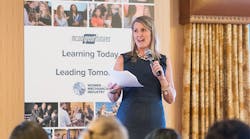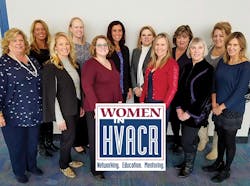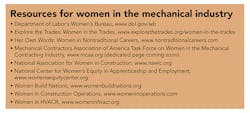Women comprise less than 10 percent of the entire construction workforce, 7 percent in engineering and 2 to 5 percent in the specialty trades such as HVAC technicians (2 percent), plumbers (2.2 percent) and welders (4.6 percent). They are better represented as construction managers (7.4 percent), helpers (9.4 percent) and inspectors (10.2 percent).
With so few female role models, it’s understandable that many women who make the decision to enter the mechanical contracting industry believe they have to go it alone. Fortunately, this is not true as industry groups focused on women and women’s issues within the construction industry continue to grow, offering women support, mentoring and networking.
“Organizations such as Women in Construction Operations are bringing awareness to some of the issues women face in our industry – such as unconscious bias or being spoken over while in a meeting,” explains Shaabini Alford, vice president of project management and design-build at Rancho Dominguez, Calif.-based mechanical contractor Murray Co., and co-founder and chapter president of WiOPs Southern California. “I think the men within our industry are starting to recognize this and they are beginning to provide the support females need to excel in our industry.”
It’s not that women are better than men, or vice versa, in this space; it’s that women think differently and they come at problems differently. Catherine Schoenberger, president of Stay Safe Traffic products as well as the National Association of Women in Construction, notes that all women’s industry groups are not anti-men. But women have unique challenges in the workplace men don’t always comprehend.
“An analogy I like to use is that we have women-focused groups in the industry because the orchestra has to practice separately,” she says. “You don’t put the drums in with the flutes. They have to practice separately so that they can understand and appreciate the melody they’re putting out. NAWIC is a business league association. We’re in it because there is a solid need for women to come together and support each other. That support in each other instills confidence and helps us push each other up in our field of study.”
The experiences women have in the traditionally male-dominated industry of mechanical contracting are as varied as the women themselves. Some have found acceptance of their role in the industry while others can identify with the #MeToo movement. The support of other women can be crucial to finding solutions to workplace challenges men do not have to deal with.
Those challenges don’t disappear in some family businesses.
“[Mechanical contracting is] a very male-dominated industry; now imagine being the boss's daughter,” says Kori Gormley-Huppert, president of McMinnville, Ore.-based Gormley Plumbing. “It’s a different set of rules. I have to work twice as hard. I have to prove myself to these men, to the people I work for, that I wasn’t handed this position. That’s what most people think.
You want to be the leader, you want their respect, but are they respecting you because they have to? My father can say one thing, but if I was to say the same thing, it doesn’t mean the same. So, it’s a little harder.”
Jennifer Olszewski, who runs her family business Heinz Mechanical Industries (Portland, Ore.) with a business partner, agrees: “My experience has always been positive but you do have to prove that you can work just as hard and can do the job as well as any man.”
On the sales side, Colleen Keyworth, sales and training coordinator at Contractor’s Online Access and the marketing manager for Women in HVACR, finds being a woman is a benefit.
“I’m coming in at a little younger level than a lot of the women before me did, including my own mentor,” she says. “I do know of women who were overlooked for a promotion or had different ways of communicating that didn’t come across right, even unfortunate situations resulting in harassment. But personally, I have found being a woman in this industry has its advantages. I think for sales especially, you’re more approachable; there’s a certain human connection. In the world of contractors that I work with, they’re usually my dad’s age and I’m treated with respect.”
Enriching careers
Gormley-Huppert is vice-chair of the newly formed Women in the Mechanical Industry task force of the Mechanical Contractors Association of America. “I think it finally was the time,” she says. “I think MCAA finally saw it was necessary. Our goal is to enrich the careers through networking, education, mentoring and career development. We also want to know what else can we do, as a group of women, to help other women in the industry.”
The task force kicked off its inaugural event at MCAA’s 2018 convention with a networking reception and sponsored a special session on two proven career advancement strategies measured to have the strongest payoff for women professionals. Women attending the reception were asked to fill out a survey of what they would like to see the group do, Gormley-Huppert notes. The group of seven women will meet again in the fall to brainstorm ideas with other women executives from MCAA, such as regional programming options.
Women in the Mechanical Industry will host a lunch and roundtable discussion at the MSCA Conference in October. MCAA also is partnering with the United Association to sponsor a dinner cruise for participants of this year’s Women Build Nation, located in Seattle.
Mentoring other women in the industry, no matter what their job title may be, is at the core of these women-focused groups.
“Just 31 percent of the construction workforce are women within professional and managerial positions,” Alford explains. “We have very few role models to look up to and to learn from, to advance the industry. Many of us have found male mentors but they often don’t seem to face the same challenges we do. WIOPS has helped me and other women in the group connect with their female mentors. It has also helped propel the discussion about diversity and inclusion in all our workplaces. I think it is really bringing a value not only to the membership but also to the companies that we all work for.”
Harassment is still an issue within the construction industry. The NAWIC board released a statement earlier this year condemning all forms of harassment, including sexual harassment and bullying. In addition, it has an industry outreach program to help employers avoid the gaffes that can turn into harassment suits.
“We’re reaching out to male employers because they’re not comfortable in what they need to project [to women employees],” Schoenberger says. “We’re giving them the conversation that can be had without feeling there’s going to be some sort of retribution because they were perceived as condescending or abusive to a woman.”
Bringing more young women into the industry is a high priority for these women’s groups and they are continually striving to promote the mechanical industry as offering lucrative careers for women, whether they want to go into project management, engineering, accounting or technicians out in the field.
“NAWIC is trying to bring the younger generation into the trade,” Olszewski says. “I spend most of my time in the office, so going to a NAWIC meeting is a great networking and educational opportunity for me.”
Work-life balance
One concern many women in the mechanical construction industry have is balancing their work lives with their family lives.
“What do you do between raising a family and getting a job?” Keyworth notes. “What’s the retention rate of women in the industry? That’s a big topic on the table right now. Women want to climb the corporate ladder but they also want to start a family. But because they go on maternity leave, or have different schedule conflicts or can’t travel as much, women are being forced to choose between whether they can raise a family or go for the full promotion. Men usually aren’t forced to make that same decision.”
Gormley-Huppert agrees: “We as women, we have to be conscious of that flexibility for other women. I’m fortunate, working in a family business, having a support system and the flexibility to be with my family while still running a company. It’s a hard thing, raising a family while working outside the home. If you want to go up the ladder in your career, getting a flex schedule is a big advantage.”
“I want young women to know they can do this, too,” notes Alford, who teaches a class on detailing and fabrication for MCAA’s Institute for Project Management. “I want those few women in my classes to know that just because they get married or start having kids, it doesn’t mean they can’t stay in this industry. Yes, they can. I am an example of that.”
For women entering the industry, Schoenberger advises them to keep their options open and to join a group that can help them navigate the unique obstacles women face in the workplace.
“There’s a lot of support available to you,” she says. “Mentoring is a huge benefit of any group and will help you become more confident in your role. When I walk into a room, I don’t think of myself as a woman. I think of myself as a professional.”













